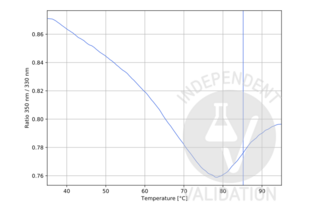Cathepsin G anticorps (Internal Region)
-
- Antigène Voir toutes Cathepsin G (CTSG) Anticorps
- Cathepsin G (CTSG)
-
Épitope
- Internal Region
-
Reactivité
- Humain
-
Hôte
- Lapin
-
Clonalité
- Polyclonal
-
Conjugué
- Cet anticorp Cathepsin G est non-conjugé
-
Application
- Western Blotting (WB), ELISA
- Specificité
- Cathepsin G Polyclonal Antibody detects endogenous levels of Cathepsin G protein.
- Attributs du produit
- Rabbit Polyclonal to Cathepsin G.
- Purification
- The antibody was affinity-purified from rabbit antiserum by affinity-chromatography using epitope-specific immunogen.
- Immunogène
- Synthesized peptide derived from the Internal region of human Cathepsin G.
- Isotype
- IgG
- Top Product
- Discover our top product CTSG Anticorps primaire
-
-
- Indications d'application
- WB 1:500-1:2000, ELISA 1:40000,
- Restrictions
- For Research Use only
-
- by
- NanoTemper Technologies
- No.
- #102721
- Date
- 05.11.2018
- Antigène
- CTSG
- Numéro du lot
- 022204892
- Application validée
- Unfolding Profile
- Contrôle positif
- ABIN3183694
- Contrôle négative
- Conclusion
Passed. ABIN3183694 showed Ti at 85.2°C and a clear unfolding profile with one unfolding event. This suggests that the protein is properly folded and functional.
- Anticorps primaire
- ABIN3183694
- Anticorps secondaire
- Full Protocol
- Dilute ABIN3183694 1:10 in PBS buffer (Roth, 1058.1, lot 285231988) to get a final volume of 15µl at a concentration of 0.67µM.
- Load sample into Tycho capillary (NanoTemper Technologies, TY-C001).
- Run Tycho measurement.
- Notes
Tycho is designed to run quick and precise protein quality check experiments. Tycho uses intrinsic protein fluorescence to follow protein unfolding while running a fast thermal ramp, yielding results in 3min. A protein’s unfolding behavior is characterized by various parameters, most notably the inflection temperature (Ti). The Ti can be used to identify properly folded protein, to compare different batches, or to analyze the influence of storage/transport conditions on a protein. An absence of Ti would suggest that the protein is already unfolded and therefore most likely nonfunctional.
Validation #102721 (Unfolding Profile)![Testé avec succès 'Independent Validation' signe]()
![Testé avec succès 'Independent Validation' signe]() Validation Images
Validation Images![p>Unfolding profile of ABIN3183694. The fluorescence signal is plotted against temperature. The native (folded) protein has a high signal at the beginning of the experiment, which decreases and then again increases upon unfolding, showing one unfolding event. The vertical line indicates the Ti at 85.2°C.]() p>Unfolding profile of ABIN3183694. The fluorescence signal is plotted against temperature. The native (folded) protein has a high signal at the beginning of the experiment, which decreases and then again increases upon unfolding, showing one unfolding event. The vertical line indicates the Ti at 85.2°C.
Protocole
p>Unfolding profile of ABIN3183694. The fluorescence signal is plotted against temperature. The native (folded) protein has a high signal at the beginning of the experiment, which decreases and then again increases upon unfolding, showing one unfolding event. The vertical line indicates the Ti at 85.2°C.
Protocole -
- Format
- Liquid
- Concentration
- 1 mg/mL
- Buffer
- Liquid in PBS containing 50 % glycerol, 0.5 % BSA and 0.02 % sodium azide.
- Agent conservateur
- Sodium azide
- Précaution d'utilisation
- This product contains Sodium azide: a POISONOUS AND HAZARDOUS SUBSTANCE which should be handled by trained staff only.
- Conseil sur la manipulation
- Avoid repeated freeze/thaw cycles.
- Stock
- -20 °C
- Stockage commentaire
- Store at -20°C.
-
- Antigène
- Cathepsin G (CTSG)
- Autre désignation
- Cathepsin G (CTSG Produits)
- Synonymes
- anticorps CATG, anticorps CG, anticorps CTSG, anticorps Ctsg, anticorps cathepsin G, anticorps CTSG, anticorps Ctsg, anticorps LOC505658, anticorps LOC509956, anticorps ctsg, anticorps LOC100053921, anticorps LOC102174648, anticorps LOC100733619, anticorps LOC100154047
- Poids moléculaire
- 22 kDa
- ID gène
- 1511
- UniProt
- P08311
- Pathways
- ACE Inhibitor Pathway, Peptide Hormone Metabolism, Regulation of Systemic Arterial Blood Pressure by Hormones
-


 (1 validation)
(1 validation)



